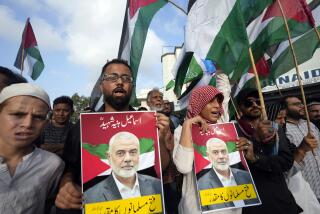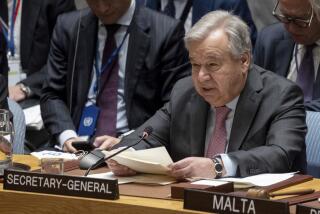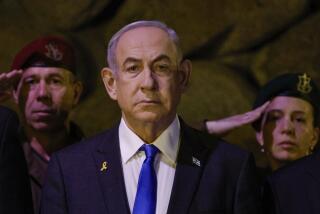U.S. Nixes U.N. Bid to Condemn Slaying of Hamas Leader
UNITED NATIONS — The United States vetoed a resolution Thursday condemning Israel’s killing of Hamas leader Sheik Ahmed Yassin because it didn’t denounce the Palestinian group’s terrorist activities. Backers of the U.N. resolution said the veto condoned political assassinations and would inflame tensions in the Middle East.
After four days of negotiations, the U.S. and other countries could not reach a compromise on a statement to denounce the killing of the Hamas leader, as the majority of the Security Council wanted, while condemning the militant group for its terrorist acts, as the U.S. demanded.
The vote was 11 countries in favor, the U.S. against, and Britain, Germany and Romania abstaining. The U.S. veto was the latest in a string of rejections of resolutions critical of Israel that did not sufficiently denounce Palestinian violence.
After the vote, American Ambassador John D. Negroponte said the U.S. was “deeply troubled” by the killing of Yassin. But he rejected the resolution because “it is silent about the terrorist atrocities committed by Hamas, because it does not reflect the realities of the conflict in the Middle East, and because it will not further the goals of peace and security in the region.”
Arab nations, represented by Algeria on the council, showed greater flexibility than previously in an attempt to reach consensus, agreeing to a clear condemnation of all acts of terrorism against civilians, implicitly denouncing Hamas. But it wasn’t far enough for the U.S., which insisted on specifying the group by name.
Although the debate seemed to stall over semantics, it was really about whether political executions are allowable and whether the Security Council can further the Middle East peace process.
“The discussion was about the verbs chosen, the word combinations,” said French Ambassador Jean-Marc de la Sabliere, who supported the resolution. But, he added, “the resolution called for a complete cessation of extrajudicial killings, which I think is a problem for the U.S. delegation.” The U.S. has used similar tactics against terrorist leaders, such as the high-ranking Al Qaeda operative who was killed in a November 2002 missile attack on his car in Yemen at U.S. behest. Critics said that killing suspects without a trial violates international law.
On Monday, immediately after the attack on Yassin, U.N. Secretary-General Kofi Annan and the European Union denounced the killing. On Wednesday, the U.N. Human Rights Commission voted 31-2 to condemn Israel for Yassin’s death. But the Security Council couldn’t agree on a statement for days, discussions only entrenching positions until the U.S. used its veto to end the debate.
“People who believe that the Security Council is the custodian of international law are waiting for it to take a position,” said Algerian Ambassador Abdallah Baali. “We do not meet here just to have speeches. The Security Council is supposed to take action.”
But Negroponte has set criteria for what kind of resolution would further the peace process, and the 15-member council has yet to meet them all. The U.S. has vetoed four U.N. resolutions on the Mideast in the last year and a half. U.S. diplomats said that they were determined to keep the issue out of the council and confined to bilateral talks.
“The United States is committed to achieving the vision of two states living side by side in peace and security,” Negroponte said. “We will support any action here in the council and, more importantly, on the ground in the region that will further that goal and will oppose any action that would impede it.”
The representative of the Palestinian Authority, Nasser Kidwa, predicted that the U.S. veto would escalate tensions in the region. “There is no doubt that millions will be unable to understand what happened today,” he said. “This indeed will not contribute to calming the situation and push toward moderation or dialogue in the region.”
Palestinian leaders tried to quell violent reaction to Yassin’s killing. Seventy Palestinian political leaders, lawmakers and intellectuals took out a half-page ad on the second page of the Palestine Liberation Organization’s semiofficial Al Ayyam daily condemning Israeli military attacks against Palestinians and calling on Palestinians not to respond violently.
“In spite of the agony and pain from the calamity that befell us, we, nevertheless, call on our people ... to restrain our rage and rise again in a peaceful and broad popular intifada with clear goals and a well-defined message,” said the statement in part.
It said such a step would challenge efforts by Israeli Prime Minister Ariel Sharon to impose his security plan on the Palestinian people.
*
Times staff writer Ken Ellingwood in Jerusalem contributed to this report.
More to Read
Sign up for Essential California
The most important California stories and recommendations in your inbox every morning.
You may occasionally receive promotional content from the Los Angeles Times.









